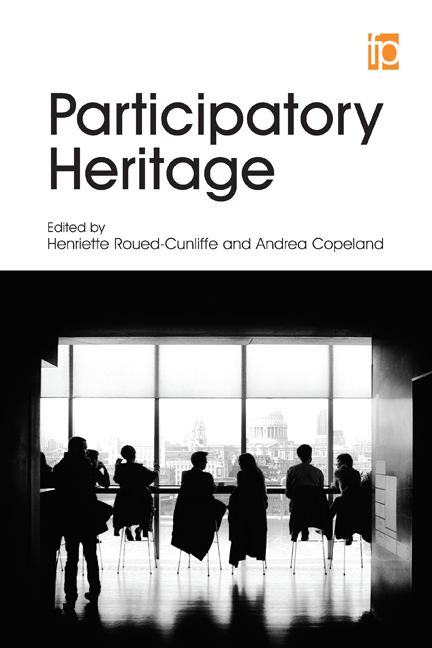Book contents
- Frontmatter
- Contents
- List of figures and tables
- Contributors
- Introduction: what is participatory heritage?
- Part 1 Participants
- 1 A communal rock: sustaining a community archives in Flat Rock, Georgia
- 2 The Bethel AME Church Archive: partners and participants
- 3 Creating an authentic learning environment for school children: a case study of digital storytelling programmes at the Mudgeeraba Light Horse Museum
- 4 Viking re-enactment
- 5 Learning, loving and living at the Australian Country Music Hall of Fame
- 6 The contributions of family and local historians to British history online
- 7 Forgotten history on Wikipedia
- Part 2 Challenges
- Part 3 Solutions
- Further reading
- Index
7 - Forgotten history on Wikipedia
from Part 1 - Participants
Published online by Cambridge University Press: 08 June 2018
- Frontmatter
- Contents
- List of figures and tables
- Contributors
- Introduction: what is participatory heritage?
- Part 1 Participants
- 1 A communal rock: sustaining a community archives in Flat Rock, Georgia
- 2 The Bethel AME Church Archive: partners and participants
- 3 Creating an authentic learning environment for school children: a case study of digital storytelling programmes at the Mudgeeraba Light Horse Museum
- 4 Viking re-enactment
- 5 Learning, loving and living at the Australian Country Music Hall of Fame
- 6 The contributions of family and local historians to British history online
- 7 Forgotten history on Wikipedia
- Part 2 Challenges
- Part 3 Solutions
- Further reading
- Index
Summary
THERE CANNOT BE much doubt, that despite resistance from various quarters, many people today begin their study of most subjects (including history) with a visit to Wikipedia (Ford, 2016). Historian Roy Rosenzweig even called Wikipedia ‘“the most important free historical resource on the World Wide Web”’ (Rosenzweig, 2006, 119).
Wikipedia is the go-to place for information, especially for young people who were born in the digital age. It's what they seek out. So even if they do a Google search and there is information about somebody or something online, they look for Wikipedia. The existence of an entry on Wikipedia gives it weight. It's kind of like ‘Oh, it's on Wikipedia? Then it's important’, [says librarian of the Schomburg Center, Maira Liriano].
(Cassano, 2015)In contrast, if a subject or person is not on Wikipedia, then it or they have a higher risk of disappearing from common knowledge.
Using Wikipedia as a path to historical knowledge is thus widespread. Heritage professionals, scholars and educators can lament this as much as they like but they cannot change human behaviour. As Isaksen (2009) so eloquently puts it ‘Pandora's box is already open’. I wholeheartedly agree with his argument that it is impossible to control cultural discourse.
Alternative histories have always existed but they were often invisible to those in authority. Now that the internet has begun to both rerender and remix them, we can begin to see just how far we, the curators and academics, are falling behind.
(Isaksen, 2009)In that sense we can see Wikipedia as potentially the biggest source of alternative histories on the internet today, as well as one of the largest examples of participants in the heritage discourse. Therefore it is important for all heritage and information professionals to consider the content of Wikipedia.
This essay seeks to frame the systemic bias of Wikipedia within the wider discourse on the general biases in history and historical archives, and will show examples of methods attempting to correct this.
Wikipedians and content
The best approach for heritage professionals is to try to influence the content found on Wikipedia and ensure that it is as accurate as possible. This is why some heritage institutions have taken to collaborating closer with Wikipedia to communicate their material (Borgen, Thylstrup and Veel, 2016).
- Type
- Chapter
- Information
- Participatory Heritage , pp. 67 - 76Publisher: FacetPrint publication year: 2017
- 2
- Cited by



